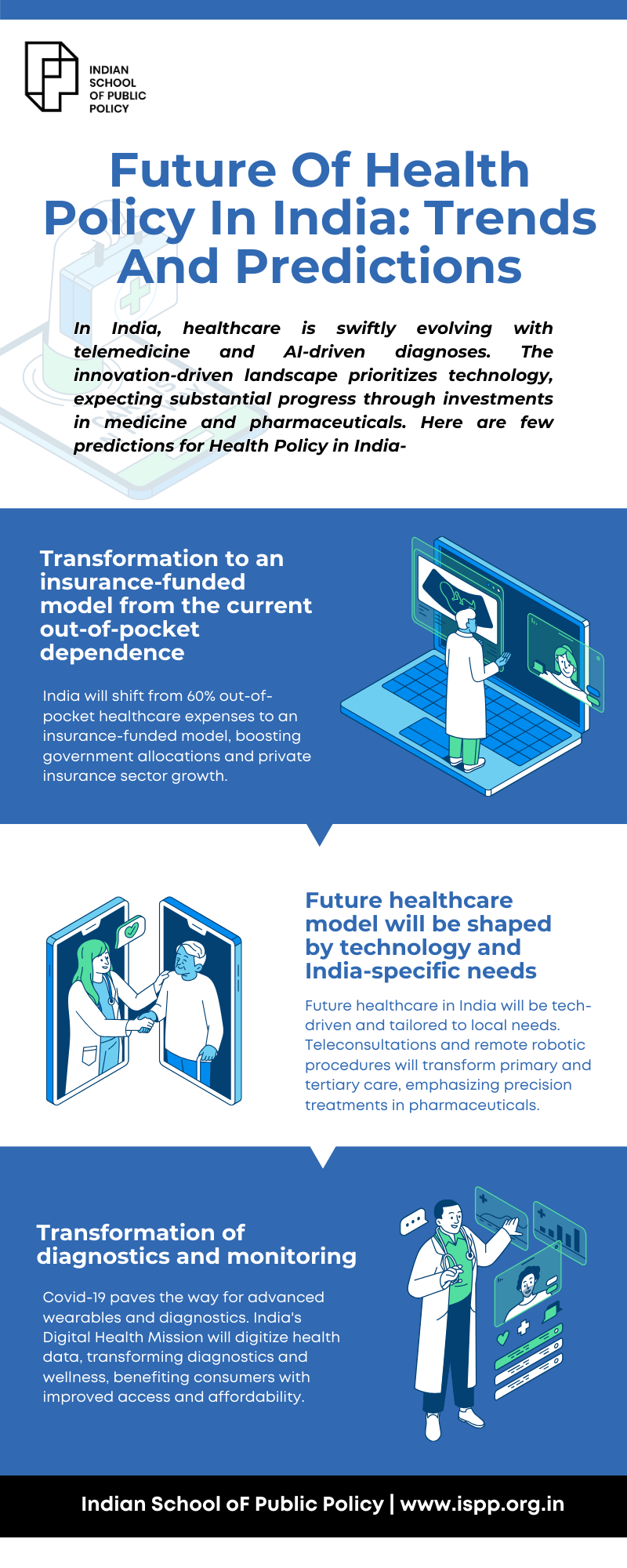
Future Of Health Policy In India: Trends And Predictions

The last decade has witnessed remarkable advancements in healthcare, promising a transformative future for India’s diverse healthcare landscape. From the rather challenging healthcare situation in the mid-20th century, there has been a notable improvement since the 1980s. India has evolved from having very few specialisations to a plethora of them, instilling confidence that it can address the health needs of its citizens, even in the case of rare diseases. A telling indicator of progress is the surge in life expectancy, now averaging 71 years compared to just 30-35 years at independence.
India has emerged as a global player in pharmaceuticals and vaccine development, a medical prowess acknowledged worldwide. The nation has also become a sought-after destination for medical tourism. However, the task ahead is to make healthcare more accessible and affordable to the population. With the anticipated breakthroughs on the horizon, affordable healthcare for all in India’s future seems promising.
Today, India stands at the cusp of transformative healthcare changes in line with the National Health Policy (NHP) 2017. The nation will grapple with the following issues 20 years later –
- The health needs of youth as well as elderly populations.
- The coexistence of communicable and non-communicable diseases
- A surging demand for mental healthcare.
- A growing middle class with elevated expectations.
Technology will also advance significantly, with robotics, nanotech, biotech, AI/ML, and Augmented Reality, driving a revolution in Indian healthcare. These pivotal shifts will shape the future of healthcare in India.
Predictions For The Future Of Indian Healthcare
As we journey toward enhanced healthcare in India, the landscape is rapidly transforming. The rise of telemedicine services and the integration of artificial intelligence for patient diagnosis is an evolving healthcare ecosystem. India is at the forefront of innovation, leveraging technology to enhance access to high-quality and affordable care. With a strong focus on technology, the healthcare sector anticipates significant progress in the years to come, underpinned by substantial investments in medicine, pharmaceuticals, and healthcare.
Also Read: Challenges In The National Health Policy
Transformation to an insurance-funded model from the current OOP (out-of-pocket) dependence
Currently, in India, approximately 60% of healthcare expenses are paid out of pocket, a significant proportion compared to economies like China (around 30%), and Brazil (about 25%). The government is steadfast in increasing budgetary allocations, aiming to raise it from around 1% of GDP to roughly 2.5% by 2025. The private health insurance sector is also expected to expand further, particularly with the anticipated inclusion of life insurers. This transition will drive industry consolidation and bolster the presence of organised healthcare chains within the ecosystem.
Future healthcare model will be shaped by technology and India-specific needs, hence very different from the current one
Improved telecommunications connectivity, the ready availability of home diagnostic devices (such as pulse oximeters and blood pressure monitors), the growing acceptance of teleconsultations by both doctors and patients (accelerated by the pandemic), and India’s vast geographical expanse are driving primary care toward remote and telehealth delivery. Experts suggest that as much as 85% of primary care can transition to teleconsultations. This shift holds the potential to address India’s persistent challenges related to the availability of healthcare professionals in remote and rural areas. Coupled with the expansion of Health and Wellness Centers (HWC) as part of the National Health Policy, the integration of teleconsultations is poised to revolutionise the landscape of primary care.
Tertiary care is on the brink of a transformation, with emerging alternative business models. Traditionally, it has been dominated by extensive multi-speciality hospitals, driven by substantial fixed costs and the need for a large pool of medical professionals. However, evolving trends in precision surgery will lead to more procedures being conducted. Breakthroughs in virtual/augmented reality (VR/AR) will facilitate remote robotic procedures, reshaping the landscape of tertiary healthcare. Expect a shift towards specialised therapy centres focusing on specific conditions, departing from the extensive multi-specialty setups seen today. The advent of remote robotic centres will bring tertiary care services closer to the citizens.
Moreover, the pharmaceutical industry must prepare for the transition from mass chemistry-based approaches to personalised biology-focused treatments.
India stands as a prominent leader in pharmaceutical exports, backed by a wealth of chemical expertise. The nation has embarked on a journey in biosimilars, a sector poised for rapid expansion in the foreseeable future. As biotechnology, including breakthroughs like CRISPR, and nanotechnology continues to progress, the healthcare landscape is shifting towards precision and personalised treatments. To adapt, India’s pharmaceutical industry must diversify into smaller batch manufacturing, focusing on individualised treatment protocols alongside its existing proficiency in large-scale standardised production methods.
Also Read : Challenges in Creating a Unified Health Record System in India: A Focus on ”ABHA”
The field of diagnostics and monitoring is on the cusp of a transformation
Covid-19 has ushered in an era of self-testing, setting the stage for rapid advancements in wearables and point-of-care diagnostics. These technologies are becoming increasingly adept at monitoring various health parameters. India’s Digital Health Mission will further promote the adoption of Electronic Health Records (EHRs), ensuring vital data is digitised and readily available. When coupled with enhanced image recognition and analytics algorithms, this digitised health data will empower doctors in interpreting conditions and making accurate diagnoses. The synergy of these technologies with teleconsultation services will revolutionise the diagnostic and medical devices industry. Diagnostic labs will pivot toward specialised and intricate tests, altering their current decentralised model. Diagnostic equipment and medical device companies must pivot from primarily serving hospitals (B2B) to end users and patients (B2C). Their product development and service delivery strategies must evolve to align with this shift.
India is transitioning towards a greater emphasis on wellness, shifting from an illness-centric approach to healthcare. Advances in nutritional science and increased societal awareness will drive a heightened focus on proper nutrition, exercise, meditation, and overall well-being. The broader availability of health insurance will promote healthier lifestyles and earlier disease screening. These changes will accelerate the wellness movement. India, renowned for Yoga’s holistic approach to mental and physical health, will witness even greater adoption of its principles throughout society.
The healthcare landscape in 2047 will be significantly different from today. All stakeholders in the healthcare ecosystem will feel the impact of these changes and need to adapt their business models accordingly. For consumers, these healthcare policies will translate into improved access, higher quality care, enhanced service levels, and more affordable healthcare for all.
Who would take charge of this transformation?
Link – https://www.youtube.com/watch?v=wXsHg2hVuVY
India’s healthcare transformation will be primarily overseen by healthcare policymakers. This group, which includes government officials, public health experts, and regulatory bodies, plays a pivotal role in formulating healthcare policies, regulations, and initiatives. Their decisions shape the direction of the healthcare system, influence funding allocation, and drive the implementation of critical programmes. With the power to enact reforms, allocate resources, and establish healthcare priorities, healthcare policymakers hold the key to driving India’s transition to a more accessible, affordable, and high-quality healthcare system.
Where will these policymakers be educated and trained?
Register your Interest to Study at ISPP
The Indian School of Public Policy
ISPP offers its flagship program, the Policy, Data Management, and Design program, to individuals eager to make a difference in public policy. This intensive one-year programme is designed to impart the science of policymaking. It consists of seven terms, each lasting 7 weeks. The program’s pinnacle is the Capstone Exercise, where scholars tackle real-world policy challenges by crafting original solutions. Alongside academic training, ISPP’s PDM Programme provides access to valuable networking, professional forums, and assistance with career development and job placements. This comprehensive curriculum equips aspiring policy professionals with the knowledge and connections they need to effect change in the public policy arena.
Programme Highlights
The programme provides a holistic understanding of public policy, integrating design and management principles. It aims to enhance students’ abilities in systems thinking and policy leadership. Beyond policy analysis and development, participants will learn to integrate practical factors like finance, capabilities, and ethics. The curriculum prioritises expertise in implementing, managing, and evaluating policies, covering both the domains of public administration and policy. This approach equips students with a well-rounded foundation for effective policy leadership and implementation.
- HARRIS UCHICAGO: CERTIFICATE IN PUBLIC POLICY
- IMMERSIVE LEARNING PROJECTS
- INTERACTIVE LABS
- CAREER SUPPORT & PLACEMENTS
- TEA & POLICY
Academic Pedagogy
ISPP’s mission is to nurture future policy leaders. Our scholars engage in a robust academic programme in Public Policy, complemented by intensive training in management, communication, and leadership.
The academic curriculum at ISPP is thoughtfully designed to cultivate expertise in theory and practice, with a focus on effecting change. It seamlessly blends classroom instruction, skill development, real-world application, and leadership and management training, spanning foundational, core, and supplementary courses. This approach equips students with a well-rounded foundation to become adept policy leaders.
Link – https://youtu.be/saFEb1Bu0sM
ISPP adopts a holistic strategy for policy, design, and management, revolving around five key pillars: Skills (S), Political Economy (P), Ethics (E), Leadership (L), and Lifelong Learning (L). Our curriculum and learning ecosystem are thoughtfully structured on the SPELL framework, ensuring a comprehensive educational journey within our institution.
See what life at ISPP looks like!
ISPP’s Student Ambassadors



Our student ambassadors are a blend of alumni and current students, well-versed in the realm of public policy. They stand ready to field your queries. Whether you’re looking for insights into our programmes, admission procedures, campus facilities, or the vibrancy of student life, our student ambassadors are here to offer guidance and information.
FAQs
What are the shortcomings in the healthcare policies in India?
More than 60% of Indians are concerned about affording medical treatment, with over 80% self-funding healthcare expenses. Yet, India’s healthcare insurance future seems promising, backed by evolving policies and technologies enhancing access, affordability, and care quality. As we approach 2030, fostering collaboration among healthcare stakeholders is vital to crafting a sustainable, inclusive healthcare system for all Indians.
Where does India stand in terms of healthcare today?
Today, India stands at the cusp of transformative healthcare changes in line with the National Health Policy. The nation will grapple with the following issues 20 years later –
- The health needs of youth as well as elderly populations.
- The coexistence of communicable and non-communicable diseases
- A surging demand for mental healthcare.
- A growing middle class with elevated expectations.
Technology will also advance significantly, with robotics, nanotech, biotech, AI/ML, and Augmented Reality, driving a revolution in Indian healthcare. These pivotal shifts will shape the future of healthcare in India.
What are the future innovations in healthcare?
Technological trends in healthcare are marked by advances such as AI and digital technology to deal with crises and improve virtual care. Telemedicine, mobile health, virtual conferencing, and the Internet of Medical Things (IoMT) are emerging healthcare technology trends.
What is the Health Policy 2025?
It strives to cut early deaths from cancer, heart issues, respiratory diseases, and diabetes by 25% before 2025. This policy highlights sustainable development and measurable targets.
What is the future of robots in healthcare?
Robotic progress may empower machines to autonomously conduct lab tests, clear artery blockages, extract tissue samples, and combat cancer. In the future, they might administer precise medications, handle minor patient care, and engage in symptom discussions.
Infographic



